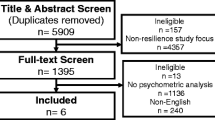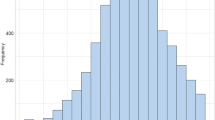Abstract
Resilience, a measure of stress coping ability, may be important in helping older people (age 50+) living with HIV (PLWH) age successfully, but limited data exist regarding factors that contribute to resilience for this group. This study uses the Connor–Davidson Resilience Scale 2 (CD-RISC2) to assess resilience, based on a cross-sectional analysis of 1047 older PLWH. Bivariate linear regression models were used to identify predictor variables that had a relationship with resilience. Those variables were then included in a multivariable linear regression model, which was pared using backward selection. In the multivariable model, higher income and greater interpersonal support were associated with greater resilience, whereas depression and anxiety were associated with lower resilience. Relevant interventions that address these issues, such as increasing opportunities for social support and increasing screening for and treatment of depression and anxiety, are identified as potential pathways to increase resilience among older PLWH.
Similar content being viewed by others
Data Availability
The data are not currently publically available. The authors may agree to share data on a case-by-case basis.
Code Availability
The Stata code used for the analyses can be made available for review on a case-by-case basis.
References
CDC. HIV and Older Americans [Internet]. Centers for Disease Control and Prevention. 2020 [cited 2020 Dec 7]. https://www.cdc.gov/hiv/group/age/olderamericans/index.html
Smit M, Brinkman K, Geerlings S, Smit C, Thyagarajan K, van Sighem A, et al. Future challenges for clinical care of an ageing population infected with HIV: a modelling study. Lancet Infect Dis. 2015;15(7):810–8.
HIV.gov. Aging with HIV [Internet]. HIV.gov. 2017 [cited 2019 Aug 27]. https://www.hiv.gov/hiv-basics/living-well-with-hiv/taking-care-of-yourself/aging-with-hiv
Ozbay F, Johnson DC, Dimoulas E, Morgan CA, Charney D, Southwick S. Social support and resilience to stress: from neurobiology to clinical practice. Psychiatry (Edgmont). 2007;4(5):35–40.
Gonzalez JS, Batchelder AW, Psaros C, Safren SA. Depression and HIV/AIDS treatment nonadherence: a review and meta-analysis. J Acquir Immune Defic Syndr. 2011;58(2):181.
Althoff KN, Smit M, Reiss P, Justice AC. HIV and ageing: improving quantity and quality of life. Curr Opin HIV AIDS. 2016;11(5):527–36.
Chaudhury S, Bakhla A, Saini R. Prevalence, impact, and management of depression and anxiety in patients with HIV: a review. Neurobehav HIV Med. 2016;7:15–30.
Connor KM, Davidson JRT. Development of a new resilience scale: the Connor–Davidson Resilience Scale (CD-RISC). Depress Anxiety. 2003;18(2):76–82.
Fang X, Vincent W, Calabrese SK, Heckman TG, Sikkema KJ, Humphries DL, et al. Resilience, stress, and life quality in older adults living with HIV/AIDS. Aging Ment Health. 2015;19(11):1015–21.
McGowan JA, Brown J, Lampe FC, Lipman M, Smith C, Rodger A. Resilience and physical and mental well-being in adults with and without HIV. AIDS Behav. 2018;22(5):1688–98.
Lyons A, Heywood W, Rozbroj T. Psychosocial factors associated with resilience in a national community-based cohort of Australian Gay men living with HIV. AIDS Behav. 2016;20(8):1658–66.
Lyons A. Resilience in lesbians and gay men: a review and key findings from a nationwide Australian survey. Int Rev Psychiatry. 2015;27(5):435–43.
Jeste DV, Savla GN, Thompson WK, Vahia IV, Glorioso DK, Martin AS, et al. Association between older age and more successful aging: critical role of resilience and depression. AJP. 2013;170(2):188–96.
MacLeod S, Musich S, Hawkins K, Alsgaard K, Wicker ER. The impact of resilience among older adults. Geriatr Nurs. 2016;37(4):266–72.
Pruchno R, Carr D. Successful aging 2.0: resilience and beyond. J Gerontol B Psychol Sci Soc Sci. 2017;72(2):201–3.
Montross LP, Depp C, Daly J, Reichstadt J, Golshan S, Moore D, et al. Correlates of self-rated successful aging among community-dwelling older adults. Am J Geriatr Psychiatry. 2006;14(1):43–51.
Cosco TD, Prina AM, Perales J, Stephan BC, Brayne C. Operational definitions of successful aging: a systematic review. Int Psychogeriatr. 2014;26(3):373.
Centers for Disease Control and Prevention. Well-being concepts [Internet]. 2018 [cited 2020 Sep 17]. https://www.cdc.gov/hrqol/wellbeing.htm
Netuveli G, Wiggins RD, Montgomery SM, Hildon Z, Blane D. Mental health and resilience at older ages: bouncing back after adversity in the British Household Panel Survey. J Epidemiol Commun Health. 2008;62(11):987–91.
Lamond AJ, Depp C, Allison M, Langer R, Reichstadt J, Moore DJ, et al. Measurement and predictors of resilience among community-dwelling older women. J Psychiatr Res. 2008;43(2):148–54.
Kalichman SC, Simbayi LC, Cloete A, Mthembu PP, Mkhonta RN, Ginindza T. Measuring AIDS stigmas in people living with HIV/AIDS: the Internalized AIDS-Related Stigma Scale. AIDS Care. 2009;21(1):87–93.
Brookings JB, Bolton B. Confirmatory factor analysis of the interpersonal support evaluation list. Am J Commun Psychol. 1988;16(1):137–47.
Löwe B, Wahl I, Rose M, Spitzer C, Glaesmer H, Wingenfeld K, et al. A 4-item measure of depression and anxiety: validation and standardization of the Patient Health Questionnaire-4 (PHQ-4) in the general population. J Affect Disord. 2010;122(1–2):86–95.
Vaishnavi S, Connor K, Davidson JRT. An abbreviated version of the Connor-Davidson Resilience Scale (CD-RISC), the CD-RISC2: psychometric properties and applications in psychopharmacological trials. Psychiatry Res. 2007;152(2–3):293–7.
Hughes ME, Waite LJ, Hawkley LC, Cacioppo JT. A short scale for measuring loneliness in large surveys: results from two population-based studies. Res Aging. 2004;26(6):655–72.
Dawson DA, Grant BF, Stinson FS, Zhou Y. Effectiveness of the Derived Alcohol Use Disorders Identification Test (AUDIT-C) in screening for alcohol use disorders and risk drinking in the US general population. Alcoholism. 2005;29(5):844–54.
Kaplan GA. Social contacts and ischaemic heart disease. Ann Clin Res. 1988;20(1–2):131–6.
Bendel RB, Afifi AA. Comparison of stopping rules in forward “stepwise” regression. J Am Stat Assoc. 1977;72(357):46–53.
Elfenbein DM, Schneider DF, Chen H, Sippel RS. Surgical site infection after thyroidectomy: a rare but significant complication. J Surg Res. 2014;190(1):170–6.
Voerman GE, Erren-Wolters CV, Fleuren JF, Hermens HJ, Geurts AC. Perceived spasticity in chronic spinal cord injured patients: associations with psychological factors. Disabil Rehabil. 2010;32(9):775–80.
Kuiper H, van Leeuwen CCM, Stolwijk-Swüste JM, Post MWM. Measuring resilience with the Connor-Davidson Resilience Scale (CD-RISC): which version to choose? Spinal Cord. 2019;57(5):360–6.
Terwee CB, Bot SDM, de Boer MR, van der Windt DAWM, Knol DL, Dekker J, et al. Quality criteria were proposed for measurement properties of health status questionnaires. J Clin Epidemiol. 2007;60(1):34–42.
Emlet CA, Shiu C, Kim H-J, Fredriksen-Goldsen K. Bouncing back: resilience and mastery among HIV-positive older gay and bisexual men. Gerontologist. 2017;57(Suppl 1):S40–9.
Fazeli PL, Woods SP, Vance DE. Successful functional aging in middle-aged and older adults with HIV. AIDS Behav. 2020;24(6):1592–8.
Rooney AS, Moore RC, Paolillo EW, Gouaux B, Umlauf A, Letendre SL, et al. Depression and aging with HIV: associations with health-related quality of life and positive psychological factors. J Affect Disord. 2019;15(251):1–7.
Rubtsova AA, Wingood GM, Ofotokun I, Gustafson D, Vance DE, Sharma A, et al. Prevalence and correlates of self-rated successful aging among older women living with HIV. J Acquir Immune Defic Syndr. 2019;82(2):S162–9.
Hildon Z, Montgomery SM, Blane D, Wiggins RD, Netuveli G. Examining resilience of quality of life in the face of health-related and psychosocial adversity at older ages: what is “right” about the way we age? Gerontologist. 2010;50(1):36–47.
Fiske A, Wetherell JL, Gatz M. Depression in older adults. Annu Rev Clin Psychol. 2009;5(1):363–89.
Rodkjaer L, Laursen T, Balle N, Sodemann M. Depression in patients with HIV is under-diagnosed: a cross-sectional study in Denmark. HIV Med. 2010;11(1):46–53.
Asch SM, Kilbourne AM, Gifford AL, Burnam MA, Turner B, Shapiro MF, et al. Underdiagnosis of depression in HIV. J Gen Intern Med. 2003;18(6):450–60.
Birrer RB, Vemuri SP. Depression in later life: a diagnostic and therapeutic challenge. AFP. 2004;69(10):2375–82.
Peterson JL, Rintamaki LS, Brashers DE, Goldsmith DJ, Neidig JL. The forms and functions of peer social support for people living with HIV. J Assoc Nurses AIDS Care. 2012;23(4):294–305.
Sood A, Prasad K, Schroeder D, Varkey P. Stress management and resilience training among department of medicine faculty: a pilot randomized clinical trial. J Gen Intern Med. 2011;26(8):858–61.
Bradshaw BG, Richardson GE, Kumpfer K, Carlson J, Stanchfield J, Overall J, et al. Determining the efficacy of a resiliency training approach in adults with type 2 diabetes. Diabetes Educ. 2007;33(4):650–9.
Loprinzi CE, Prasad K, Schroeder DR, Sood A. Stress Management and Resilience Training (SMART) program to decrease stress and enhance resilience among breast cancer survivors: a pilot randomized clinical trial. Clin Breast Cancer. 2011;11(6):364–8.
CDC. Earned Income Tax Credits Can Improve Health for Mothers and Children [Internet]. Centers for Disease Control and Prevention. 2021 [cited 2021 Aug 5]. https://www.cdc.gov/policy/hst/hi5/taxcredits/index.html
West S, Castro Baker A, Samra S, Coltera E. SEED: Stockton Economic Empowerment Demonstration Preliminary Analysis - SEED’s First Year [Internet]. 2021. https://static1.squarespace.com/static/6039d612b17d055cac14070f/t/6050294a1212aa40fdaf773a/1615866187890/SEED_Preliminary+Analysis-SEEDs+First+Year_Final+Report_Individual+Pages+.pdf
Funding
This study was funded by ViiV Healthcare. Jeff Berko, Peter Mazonson, and Theoren Loo have received research funding from ViiV Healthcare to develop ADHOC and collect data. Philip Grant has received research support from ViiV Healthcare. Andrew Zolopa, Frank Spinelli, and Duncan Short are employees of ViiV Healthcare.
Author information
Authors and Affiliations
Contributions
All authors made substantial contributions to the conception or design of the work. JB, PM and TL drafted the work. PG, AZ, FS and DS each revised it critically for important intellectual content. All authors agree to be accountable for all aspects of the work in ensuring that questions related to the accuracy or integrity of any part of the work are appropriately investigated and resolved.
Corresponding author
Ethics declarations
Conflict of interest
All authors declare that they have no conflict of interest to declare.
Ethical Approval
The ADHOC study protocol was approved by Ethical and Independent Review Services (E&I #17130).
Consent to Participate
Written informed consent was collected from all participants.
Consent for Publication
Not applicable.
Additional information
Publisher's Note
Springer Nature remains neutral with regard to jurisdictional claims in published maps and institutional affiliations.
Rights and permissions
About this article
Cite this article
Berko, J., Mazonson, P., Loo, T. et al. Factors Associated with Resilience Among Older People Living with HIV. AIDS Behav 26, 1448–1455 (2022). https://doi.org/10.1007/s10461-021-03499-z
Accepted:
Published:
Issue Date:
DOI: https://doi.org/10.1007/s10461-021-03499-z




